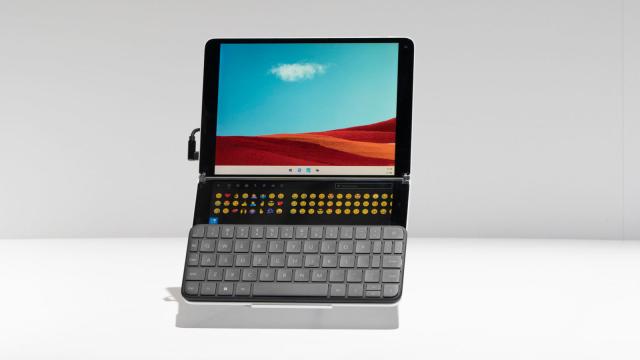Microsoft put on one of the most exciting tech conferences in recent history last fall when it showcased Windows 10X alongside dual-screen devices including the Surface Duo and Surface Neo. Unfortunately, due a to number of recent complications, it seems both Windows 10X and the Surface Neo have been delayed and won’t make their original late 2020 release dates.
The latest info regarding Windows 10X’s development comes from ZDNet’s Mary Jo Foley, who says, according to inside sources, Microsoft chief product officer Panos Panay held an internal briefing informing some of his team that Microsoft wouldn’t be delivering Windows 10X or the Surface Neo in 2020. Furthermore, it seems Microsoft won’t be enabling Windows 10X on third-party devices, which would put a major hold on other dual-screen devices like Asus’ Project Precog concept.
Based on a few sources I’ve spoken to and other whispers around the industry, a number of dual-screen Windows 10X devices were slated to be shown off at Computex 2020 (which was originally scheduled for June, but has now been pushed back to September), followed by retail availability going live during 2020 holiday season.
However, with covid-19 wreaking havoc on global supply chains and disrupting product development by forcing many tech employees to work from home, Foley says Microsoft is shifting priorities to deliver Windows 10X on single-screen devices first, possibly as a way for Microsoft to better compete with other budget laptops based on Google’s Chrome OS.
Officially, Windows 10X is primarily designed to support dual-screen devices, however it also contains a number of other features, including the ability to run legacy 32-bit Windows apps inside a virtual container, which could be an important compatibility tool for Microsoft going forward. And while Windows 10X itself might not be ready for a 2020 release, Foley claims her sources say some Windows 10X features, like containerised apps, could get incorporated into standard Windows “sooner rather than later.”
The one bright spot in this bad news is that while the Surface Neo probably won’t make its original 2020 release date, its sibling, the Surface Duo, doesn’t seem to have been affected by the delays, most likely because it is based on Android and not Windows 10X.
While this new is surely to be disappointing for people (myself included) who were looking forward to a flurry of next-gen dual-screen laptops, given the circumstances, delaying Windows 10X and the Surface Neo seems like a prudent decision.
Part of the goal with Windows 10X is to support a wave of devices with radically different and more sophisticated designs than today’s clamshells, but if rushing Windows 10X out before it’s ready resulted in a ton of bad first impressions, a lot of that work could be wasted and could make device-makers think twice about creating dual-screen devices for Windows 10X in the future.
